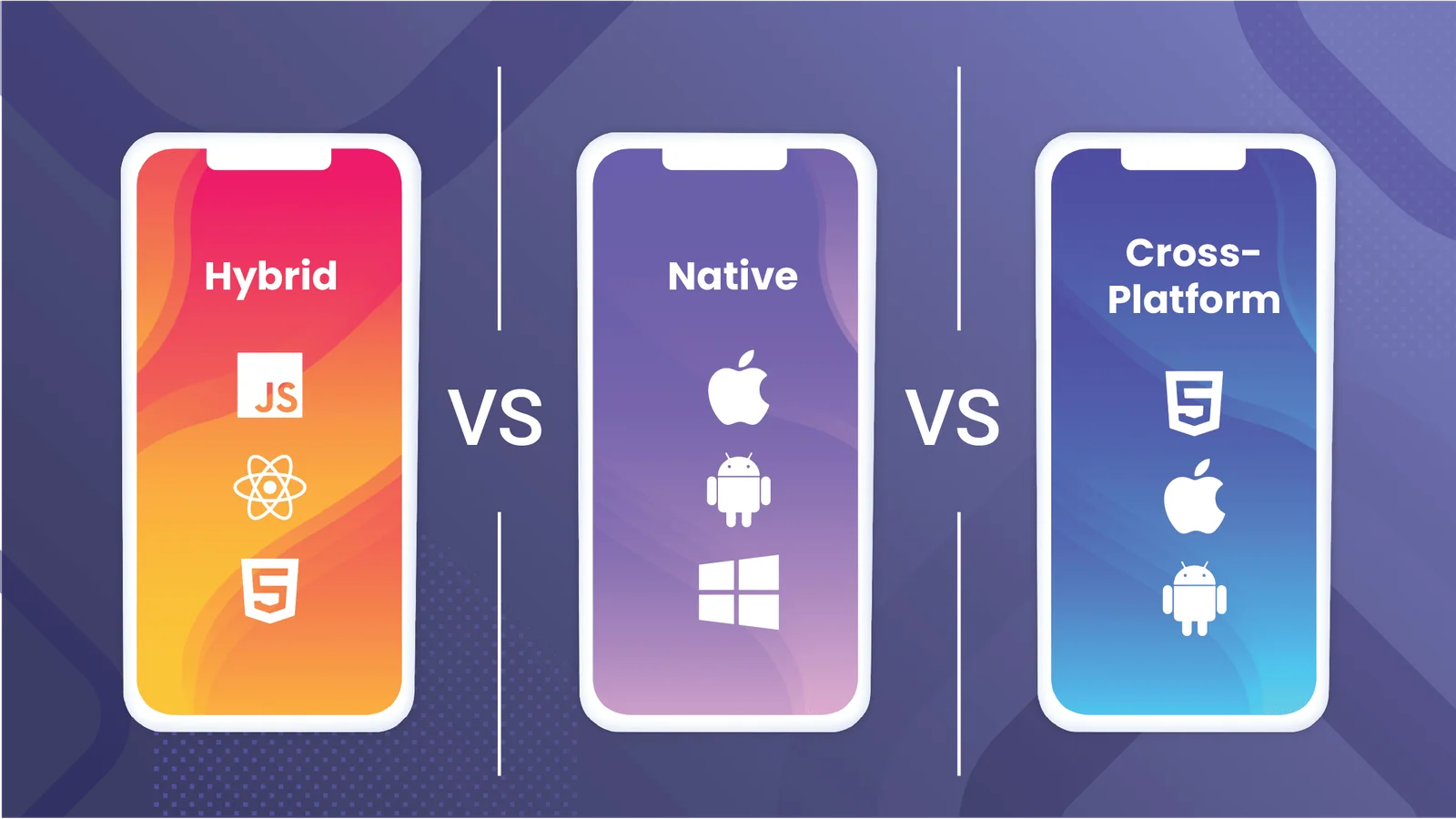If you are planning to have your mobile app in 2023, then you must plan your strategy first. It’s very important to select a development strategy based on requirements. Every platform has its own features. You need to choose according to your needs.
There are three platforms for which one can opt: Native, Hybrid, and cross-platform. I will discuss all platforms in this blog. At the end of this blog, I will provide a comparison of the three.
Introduction to Native Development, Hybrid Development, and Cross-Platform Development
1. Native Development
When we talk about native development, it means building apps for a particular operating system like iOS or Android. Developers have full access to the platform’s features and capabilities and can create more customized and controlled apps. These apps are also faster and more reliable compared to other types of apps because they are specifically designed for that particular platform. However, creating native apps requires more specialized skills and may take more time and money to develop.
2. Hybrid Development
Hybrid development means making apps using web technologies like HTML, CSS, and JavaScript. Then, we can change them into native apps by using a framework such as Cordova or PhoneGap. Hybrid apps work on multiple platforms, so they are a great option for businesses that want to reach many people. They are also usually quicker and simpler to develop because developers can use existing web skills and resources. However, hybrid apps may be less reliable and slower than native apps, and they might not be able to access all of the platform-specific features.
3. Cross-Platform Development
Cross-platform development is about building apps using one codebase that can work on many different platforms. This method saves time and effort for developers because they can use the same code and resources for all the platforms. Cross-platform apps can be quicker and simpler to create than native apps because of this. However, cross-platform apps may not be as optimized and customizable as native apps, and they may not have access to all the platform-specific features.
Choosing between native, hybrid, or cross-platform development depends on what a business needs and wants. To decide which method to use, a business should think about its budget, how long it will take, who its audience is, and what the app needs to do. Talking to experienced developers who can give advice can also be helpful when making this decision.
Pros and Cons of Native, Hybrid, and Cross-Platform Development
1. Native Mobile App Development:
Developing a native mobile app means making it with programming languages and tools that are only used for one type of operating system, like iOS or Android. Here are some advantages and disadvantages of native mobile app development:
Pros of Native Development:
- Speed: Native apps work faster than other types of apps because they are designed specifically for the operating system they will be used on. This is possible because native apps can directly use all of the device’s hardware and resources, like the camera, microphone, and GPS.
- User-Friendly: Native apps give a seamless experience to users that matches the design, interface, and navigation patterns of the platform. This is possible because native apps can use the platform’s own UI components, animations, and gestures.
- Access to Special Features: Native apps can use all of the unique features and abilities of the platform they are made for, like push notifications, in-app purchases, and location services. This makes it possible to have more customization and useful functions in the app.
Cons of Native Development:
- Development Time and Cost: Developing native apps requires specialized skills and expertise in the programming languages and tools specific to each platform. This means that development time and costs can be higher than other types of apps, especially if you want to build an app for both iOS and Android.
- Maintenance and Updates: Native apps need to be updated frequently to fix bugs, add new features, and ensure compatibility with the latest operating system versions. This can be time-consuming and costly, especially if you need to maintain separate codebases for each platform.
- Limited Reach: Native apps are specific to a particular operating system, which means that they are not compatible with other platforms. This can limit your app’s reach and potential user base, especially if you are targeting a broad audience.
In summary, native mobile app development offers superior performance, user experience, and access to platform-specific features, but comes with higher development costs, maintenance, updates, and limited reach. Businesses should weigh these pros and cons when deciding which development approach to pursue.
Tools for Native Mobile App Development
2. Hybrid Mobile App Development
It involves building apps using web technologies like HTML, CSS, and JavaScript, and then wrapping them in a native app shell to be deployed on different platforms. Here are some of the key pros and cons of hybrid mobile app development:
Pros of Hybrid App Development:
- Cross-Platform Compatibility: Hybrid apps can be deployed on multiple platforms using a single codebase, which makes it easier and more cost-effective to develop and maintain apps for different operating systems.
- Faster Development Time: Hybrid apps can be developed faster than native apps because they use web technologies that are familiar to many developers, and the same codebase can be used across platforms.
- Lower Development Cost: Hybrid apps can be developed at a lower cost than native apps because they require less specialized development skills and can be developed faster.
Cons of Hybrid App Development:
- Performance: Hybrid apps may not perform as well as native apps because they run in a web view. This can cause a lag in performance, especially for apps that require high graphics or processing power.
- User Experience: Hybrid apps may not provide the same seamless user experience as native apps because they use web technologies that cannot take advantage of the native UI components, animations, and gestures provided by the operating system.
- Limited Access to Platform-Specific Features: Hybrid apps may not have access to all the platform-specific features and capabilities, which can limit their functionality and customization.
In summary, hybrid mobile app development offers cross-platform compatibility, faster development time, and lower development cost, but may sacrifice performance, user experience, and access to platform-specific features. Businesses should weigh these pros and cons when deciding which development approach to pursue, based on their specific needs and resources.
3. Cross-Platform App Development
It involves building apps using a single codebase that can be deployed on different platforms, such as iOS and Android, without requiring significant modifications to the code. Here are some of the key pros and cons of cross-platform app development:
Pros of Cross-Platform Development:
- Cross-Platform Compatibility: Cross-platform apps can be deployed on multiple platforms using a single codebase, which makes it easier and more cost-effective to develop and maintain apps for different operating systems.
- Faster Development Time: Cross-platform apps can be developed faster than native apps because they use common development languages like JavaScript or C#, and the same codebase can be used across platforms.
- Lower Development Cost: Cross-platform apps can be developed at a lower cost than native apps because they require less specialized development skills and can be developed faster.
- Access to Platform-Specific Features: Cross-platform app development frameworks like React Native, Xamarin, or Flutter provide access to platform-specific features and capabilities, such as camera, GPS, and push notifications, among others.
Cons of Cross-Platform Development:
- Performance: Cross-platform apps may not perform as well as native apps because they use a layer that sits on top of the native platform, which can cause a lag in performance, especially for apps that require high graphics or processing power.
- User Experience: Cross-platform apps may not provide the same seamless user experience as native apps because they may not be able to take advantage of the native UI components, animations, and gestures provided by the operating system.
- Complexity: Cross-platform app development can be more complex than other types of app development because developers need to work with multiple platforms and tools simultaneously.
- Dependency on Third-Party Tools: Cross-platform app development frameworks rely on third-party tools and libraries, which may introduce compatibility issues or dependency on the framework.
In summary, cross-platform app development offers cross-platform compatibility, faster development time, lower development cost, and access to platform-specific features, but may sacrifice performance, and user experience, and introduce complexity and dependency on third-party tools. Businesses should weigh these pros and cons when deciding which development approach to pursue, based on their specific needs and resources.
Here is a comparison of the above three technologies
| Criteria | Native App Development | Cross-Platform Development | Hybrid App Development |
| Usage | Apps built for specific platforms like iOS or Android. | Apps built to run on multiple platforms using a single codebase. | Apps built to run on multiple platforms using a combination of native and web technologies. |
| User Experience | High-quality user experience due to platform-specific design and functionality. | Decent user experience due to cross-platform tools, but may not offer platform-specific features. | User experience can vary depending on how well native and web technologies are integrated. |
| Development Cost | Expensive, as separate development is required for each platform. | Affordable, as the single codebase can be used across multiple platforms. | Affordable, as the single codebase can be used across multiple platforms, but can be more expensive if extensive customization is needed. |
| Development Time | Longer, as separate development is required for each platform. | Faster, as the single codebase can be used across multiple platforms. | Faster, as the single codebase can be used across multiple platforms, but can be longer if extensive customization is needed. |
| Performance | Best performance due to native code running directly on the platform. | Decent performance, but not as good as native apps. | Performance can vary depending on how well native and web technologies are integrated. |
| Maintenance | Requires separate maintenance for each platform, which can be time-consuming and expensive. | Easier to maintain as the single codebase can be updated across multiple platforms. | Easier to maintain as the single codebase can be updated across multiple platforms, but can be more complex if extensive customization is needed. |
| Examples | Instagram, Spotify (iOS and Android versions). | Airbnb, Uber (using React Native). | LinkedIn, Twitter (using Ionic or PhoneGap). |
In conclusion, choosing the right approach for app development can significantly impact the success of your project. Native app development provides the best user experience and performance, but it is also the most expensive and time-consuming. On the other hand, cross-platform and hybrid app development provides affordable and faster solutions that allow you to target multiple platforms with a single codebase but can compromise performance and user experience.
Before choosing an approach, consider the specific requirements of your project, such as the target audience, budget, timeline, and desired features. Assessing the pros and cons of each approach can help you make an informed decision that aligns with your goals and resources. Additionally, it’s essential to work with an experienced mobile app development team that can guide you through the process and help you deliver a high-quality app that meets your expectations. Ultimately, the success of your app development project depends on choosing the right approach and executing it effectively.




